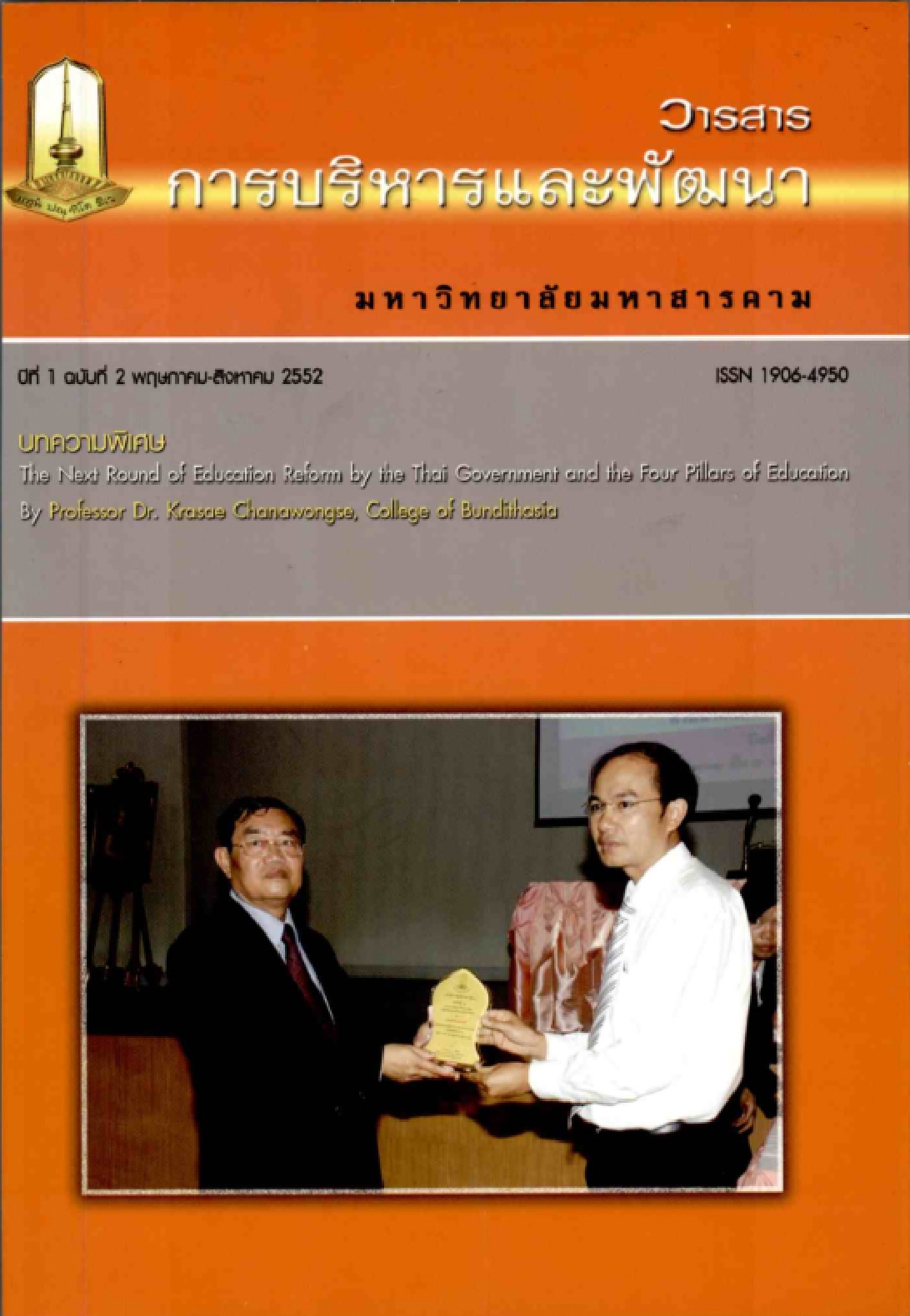Developing a Knowledge Management Model for Educational Quality Assurance in Faculty of Education, Mahasarakham University
Main Article Content
บทคัดย่อ
The goal of this study is to implement knowledge management (KM) for educational quality assurance (QA), specifically in the divisions of the Faculty of Education, and to identify factors of success of KM for QA. The sample for this study, using the purposive sampling technique, consisted of 19 members of the operational committee of the Division of Research, Academic Service and Educational Quality Assurance according to the Faculty of Education's order No. 248/2006 dated on May 2006. Participation was voluntary. Mixed methods were used including participatory action research (PAR), research and development, qualitative research and quantitative research. Findings: 1) The model of KM development in QA con- sisted of these 6 states: (1) team/core-leader preparation, (2) building motivations and partici- patory working, (3) making the plans and developing team potentials, (4) putting the plans into practice and developing work, (5) follow-up and upgrading the body of knowledge, and (6) evaluation for conclusions. Furthermore, in developing and testing the KM model for QA, the following were found: The KM model as a whole was appropriate at the highest level. Groups of people, known as "communities of practice (Cops)", operated KM according to the 6 aspects of the learning process. Sources of Knowledge were from problems, raising ques- tions concerning development including building knowledge, classifying knowledge, storing knowledge, implementing knowledge, sharing knowledge, and assessing knowledge. The Faculty of Education had a KM center responsible for this process. Finally, factors of success in KM for QA of Faculty of Education were: the use of leadership of the researcher, partici- pants, and administrators. Faculty of Education administrative committee members were learners and instructors. Leaders in KM had to create positive awareness of organizational development, provision of opportunities for participants to have participation from the begin- ning and to be responsible for conducting the research, learning by practicing and improving and sharing learning at the levels of persons, community groups and practitioners.
Downloads
Article Details
เอกสารอ้างอิง
Chantarasombat, Chalard. (2007). Developing a Knowledge Management Model for Commu- nity Self-reliance. Maha Sarakham: Mahasarakham University
Faculty of Education. (2006). Faculty of Education Strategic Plans, 2006-2009. Faculty of Education, Maha Sarakham: Mahasarakham University
Nonaka, I. and Takeuchi, H. (1995). The Knowledg-creating Company: How Japanese Compa- nies Create the Dynamics of Innovation. New York: Oxford University Press.
Office of Educational Standards Certification and Quality Assessment. (2007). A Draft of a Report on Results of External Quality Assessment in Round 2, Mahasarakham Uni-versity. Office of Educational Standards Certification and Quality Assessment.
Office of Special Committee for Coordination with the Projects Following the Royal Ideas. (Unknown Date). H.M.T. the King's Working Principle. Bangkok: King ChulalongkornCadet School.
Phanich, Vicharn. (2005). Know Management, a Practitioner Version. Bangkok: Institute of Knowledge Management for the Society (IKMS).
Senge, M. (1990). The Fifth Discipline: The Art and Practice of the Learning Organization. New York: Doubleday.
Thinnalak, Yuwanut. (2006). Riddles of Local Wisdom. Bangkok: Institute of the Vision Way.
Wasi, Prawet. (2002). The Intelligence Network. Bangkok: Design.
Wiig, K. (1993). Knowledge Management Foundations. Arlington, Texas: Schema Press.


